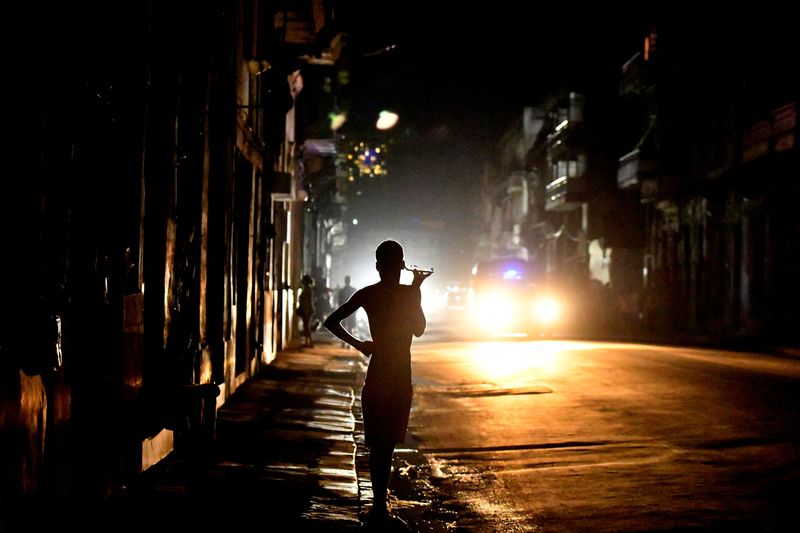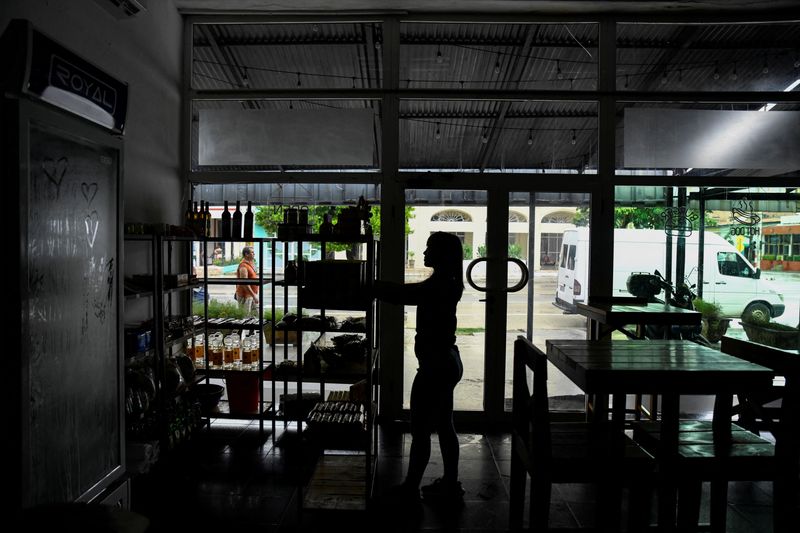By Dave Sherwood and Marianna Parraga
HAVANA (Reuters) -Cuba restored a trickle of power to its grid by mid-evening on Friday, officials said, hours after the island plunged into a countrywide blackout following the collapse of one of its major power plants.
The vast majority of the country's 10 million residents were still in the dark on Friday night, but scattered pockets of the capital Havana, including some of the city's major hospitals, saw lights flicker back on shortly after dark.
Grid operator UNE said it hoped to restart at least five of its oil-fired generation plants overnight, providing enough electricity, it said, to begin returning power to broader areas of the country.
The Communist-run government closed schools and non-essential industry early on Friday and sent most state workers home in a last-ditch effort to keep the lights on after weeks of severe power shortages. Recreational and cultural activities, including night clubs, were also ordered closed.
But shortly before midday, the Antonio Guiteras power plant, the country's largest and most efficient, went offline, prompting a total grid failure and suddenly leaving the entire island without power.
Officials said late on Friday they were working to fix the problem that had led the oil-fired plant to fail. They did not specify the cause of its collapse.
The blackout marks a new low point on an island where life has become increasingly unbearable, with residents suffering from shortages of food, fuel, water and medicine.
Virtually all commerce in Havana ground to a halt on Friday. Many residents sat sweating on doorsteps. Tourists hunkered down in frustration. By nightfall, the city was almost completely enveloped in darkness.
“We went to a restaurant and they had no food because there was no power, now we are also without internet," said Brazilian tourist Carlos Roberto Julio, who had recently arrived in Havana. "In two days, we have already had several problems.”
Prime Minister Manuel Marrero this week blamed worsening blackouts during the past several weeks on a perfect storm well-known to most Cubans - deteriorating infrastructure, fuel shortages and rising demand.
"The fuel shortage is the biggest factor," Marrero said in a televised message to the nation.
Strong winds that began with Hurricane Milton last week have crippled the island's ability to deliver scarce fuel from boats offshore to its power plants, officials said.
REDUCED FUEL
Cuba's government also blames the U.S. trade embargo, as well as sanctions under then-President Donald Trump, for difficulties in acquiring fuel and spare parts to operate its oil-fired plants.
"The complex scenario is caused primarily by the intensification of the economic war and financial and energy persecution of the United States," Cuban President Miguel Diaz-Canel said on X on Thursday.
A White House National Security Council spokesperson said, "The United States is not to blame for today's blackout on the island, or the overall energy situation in Cuba."
A State Department official said late on Friday that Washington was closely monitoring the potential humanitarian impact of the blackout but that the Cuban government had not requested assistance.
For many Cubans, far removed from politics and accustomed to regular power outages, the nationwide blackout was nothing more than a normal Friday night.
Carlos Manuel Pedre said he had defaulted to simple pleasures to pass the time.
"In the times we're living in, with everything happening in our country, the most logical entertainment is dominoes," he said as he played the popular game with friends. "We're in total crisis."
While demand for electricity has grown in recent years alongside Cuba's fledgling private sector, fuel supply has fallen sharply.
Cuba's largest oil supplier, Venezuela, has reduced shipments to the island to an average of 32,600 barrels per day in the first nine months of the year, barely half the 60,000 bpd sent in the same period of 2023, according to vessel-monitoring data and internal shipping documents from Venezuela's state company PDVSA.
PDVSA, whose refining infrastructure is also ailing, has this year tried to avoid a new wave of fuel scarcity at home, leaving smaller volumes available for export to allied countries like Cuba.

Russia and Mexico, which in the past have sent fuel to Cuba, have also greatly reduced shipments.
The shortfalls have left Cuba to fend for itself on the far costlier spot market at a time when its government is near-bankrupt.
